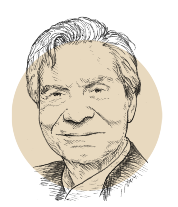The United States is no longer the protector of the world order, and this global retreat is not just down to Donald Trump. He certainly accelerated the phenomenon by allowing Russia and Syria to annex neighboring territories, by withdrawing from NATO and soon Afghanistan, and by refusing to make statements about the protests in Hongkong and Bolivia, and the widespread incarceration of the Uyghurs in China. It is now uncertain whether the U.S. army would oppose a Russian invasion of Latvia, and Trump seems ready to leave the supervision of North Korea to Japan.
Once again, this is not solely Trump’s doing. His methods and positions leave many flabbergasted, but he is in fact continuing a strategy first launched by Barack Obama. The previous president was elected to break from his predecessors’ interminable and repeated military interventions in Kuwait, Afghanistan, Iraq, and Somalia. His refusal to intervene in the Syrian Civil War in 2013 marked a symbolic turning point in American diplomacy.
Simply put, the Middle East was no longer America’s main priority; it was up to the Arabs to resolve their own conflicts. The United States’ withdrawal was also made easier by the end of its dependence on the region’s oil. The U.S. is now the world’s leading producer of gas and oil, and can even export its surplus. Israel is the only country in the region that still counts, although this is a matter of American and Western domestic policy.
In 2012, Obama also announced that America’s foreign policy would “pivot” towards Asia. Europe was no longer the center of the world, and the Russian threat was seen as insignificant. For both Obama and Trump, the world’s axis and the future of the United States depended on events happening between Beijing and New Delhi. This indifference towards Europe and the Middle East has been reflected in Trump’s withdrawal from NATO. Very recently, Emmanuel Macron gave an interview with British magazine The Economist, stating that NATO was becoming “brain-dead.” While he received a storm of criticism for his statement, it was less because of what he said and more because he voiced what everyone else was thinking. From the moment NATO failed to act when Russia annexed Crimea and Eastern Ukraine, then let Turkey make a pact with Russia to invade Syria, it no longer existed and was unlikely to ever again.
This was all predictable for anyone looking back through the history of the United States. The Americans – both the people and their government – did not become the world police intentionally. It was to escape European quarrels, not to preside over them, that the U.S.A. was founded. America did intervene in World War I, then in World War II, but only later on and after their direct interests were threatened. While America also remained in Europe after 1945, helped create NATO, and intervened in Korea, it was not to defend the world order but to resist the global threat of communism. Soviet imperialism could have destroyed both the values and, more importantly, the interests of the United States. The U.S.S.R. fell and was replaced by a relatively modest Russian power; Europe is deemed capable of defending itself and has no real enemies; and although frightening, the Islamists remain marginal. China is now the only figure able to cast a shadow over America.
But China is dwarfed by the United States in military terms and has no Soviet-style imperialist vision. And while it may “steal” a handful of jobs and patents from the U.S.A., it poses no threat to Americans. This context has enabled Trump to reembrace the most profound tradition of the American people: isolation. In 1821, in response to an appeal from Greek independentists against the Ottomans, Secretary of State John Quincy Adams declared that “the United States does not go abroad in search of monsters to destroy.” His statement went down in history and was a cornerstone of U.S. non-interventionist policy until the two world wars.
Should we expect the United States to return to the world stage in a post-Trump era? This scenario remains doubtful, given that none of his Democrat opponents discuss foreign policies, and the rare protests in the U.S.A. against the abandonment of their Kurdish allies in Syria have already died down. Just like President Woodrow Wilson when discussing the future world map in 1918, today’s Americans are generally unable to pinpoint Kurdistan.
This brings us back to the old continent. Without America as world police, who will guarantee Europe’s security? And is it really under threat? After the annexation of Crimea and the Ukrainian Donbass, those in Poland, Romania, and the Baltic region have cause for concern. The creation of a new Islamist caliphate between Burkina Faso and Niger would also constitute a dangerous terrorist base pitted against Europe and its direct allies such as Morocco. NATO must therefore be abandoned and replaced by a common European defense network. This is not a choice but rather a necessity, and should not be delayed in the hope of some American messiah returning to the fray. To the U.S. soldiers who gave their lives for us, we should say thank you, and farewell.












